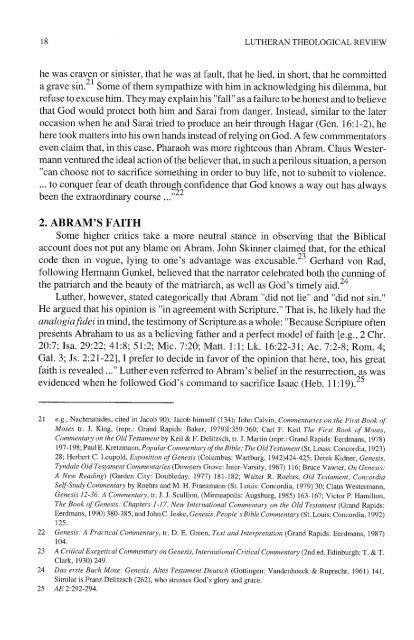ST. CATHARINES CONCORDIA - Brock University
ST. CATHARINES CONCORDIA - Brock University
ST. CATHARINES CONCORDIA - Brock University
You also want an ePaper? Increase the reach of your titles
YUMPU automatically turns print PDFs into web optimized ePapers that Google loves.
18 LLI'HEKAN THEOLOGICAL REVIEW<br />
he was craven or sinister, that he was at fault, that he lied, in short, that he cornrnitled<br />
a grave sin.21 Some of them sympathize with him in aclcnowledging his dilemma, but<br />
refuse ro excuse him. Thcy may explain his "fall" as a failure to be honest and to believe<br />
that God would protect both him and Sarai from danger. Instead, similar to the later<br />
occasion when he and Sxai tried to produce an heir through Hagar (Gcn. 16:l-21, he<br />
herc took matters into his own hands instead of relying on God. A few com~nmentators<br />
even claim that, in this case, Pharaoh was more righteous than Abram. Claus Westermann<br />
ventured the ideal action of the belicvcr that, in such aperilous situation, a person<br />
"can choose not to sacrifice something in order to buy life, not to submit to violence.<br />
... to conquer rear of death through confidence that God knows a way out has always<br />
been the extraordinary coursc ... , ,22<br />
2. ABRAM'S FAITH<br />
Somc highcr critics takc a more neutral stance in observing that the Biblical<br />
account does not put any blame on Abram. John Skinner claimed that, for the ethical<br />
code then in vogue, lying to one's advantage was cx~usable.~~ Gcrhard von Rad,<br />
following Hermann Gunkel, believed that the narrator celebrated both the cunning of<br />
the patriarch and the beauty of the matriarch, as well as God's timely aid.24<br />
Luther, however, statcd categoricallj~ that Abram "did not lie" and "did not sin."<br />
Hc argued that his opinion is "in agreement with Script~~re." That is, he likely had the<br />
unnlogiufidei in mind, the Lestimony of Scripture as a whole: "Because Scripture often<br />
presents Abraham to us as a bclicving father and a perfect model of faith [e.g., 2 Ch.<br />
20:7; Isa. 29:22; 41:8: 51:2; Mic. 7:20; Matt. 1:l; Lk. 16:22-31; Ac. 7:2-X; Rom. 4;<br />
Gal. 3; Js. 2:21-221, 1 prefer to decide in favor of the opinion that hcre, too, his great<br />
faith is rcvcaled ..." Luthcr even referred to Abram's belief in the resurrection, as was<br />
evidenced when he followed God's conlrnand to sacrifice Isaac (Heb. 11: 19).25<br />
e.g., Nachmanidcs, ciled in Jacob 90): Jacub himself (134); John Calvin. Cornmclztarics on the Fiist Book of<br />
Mosrs h-. J. King, (reps.: Grand Rapids: Baker. 1979K359-360; Car1 F. Kcil Tiw First Book of Moses,<br />
Cornme~nary on the OldTestamenr by Keil &F. Delirzsch, tr. J. Mxtin (rcpr.: Grand Rapids: lierdmans, 1978)<br />
197-198; PaulE. Kretzmann, PopuIar Conm?cnrary of t h Rihle: ~ T ~ Oiil'l'esfoment P<br />
(St. Louis: Conco~dia, 1923)<br />
28; Herbert C. Leupold, Expo.~zth nf(;rnr.~i~ (Columhus: Wwtburg, 1942)424-425; Derek Kidne~, Gena~is,<br />
Tyridale Old Tr~rtlnwit Cornn~~nto~ws (Downers Grove: Inter-Vru-sity, 1967) llG; Bruce Vawier, 012 Genesis:<br />
A New li'mding) (Garden Clty: Doubleday, 1977) 181-152; Walier R. Roehrs, Old Testanzent. Concorclia<br />
Sey-Study Commenfaly by Roehs ad M. H. Franzrnann (St. Luuis: Concordia, 1979) 30; Claus Westermann,<br />
Genesis 12-36. A Cornmentulv, tr. J. J. Scullion, (Minneapolis: Augsburg, 1985) 163-167; Victor P. Hamilton,<br />
The Book uf Genes&. Chupters 1-17, New Into-nntionul Conlmentary on the Old Testanz~nt (Grand Rapids:<br />
Eerdmans. 1990) 380-385; and John C. Jeske, Genesis, People's Bible Commentmy (St. Louls: Concordia, 1992)<br />
125.<br />
Genesis: A P~.actlcal Comnientur:v, 11.. D. E. Green, '1L.xt nnd Intelptetatioti (Grand Rapids: Eedmans. 1987)<br />
104.<br />
A C~vtlral













